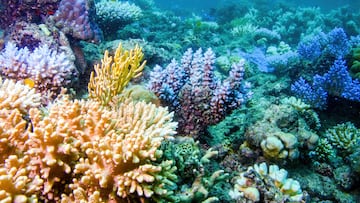Marine scientists discover the secret to protecting Florida’s coast in the depths off Honduras
Scientists have found an unlikely solution to keeping Florida’s corals safe.


Once again, science continues to pave the way for innovation and prosperity on planet Earth.
South Florida scientists have, in a first‑of‑its‑kind move for reef conservation, successfully crossbred and transplanted Elkhorn coral from Honduras into Florida’s reefs in what is undoubtedly a bold effort to inject much‑needed resilience into a fragile ecosystem that is fighting against the odds to survive.
Over 95% of Florida’s Elkhorn coral (Acropora palmata), a key species of the 350‑mile reef system, has vanished in recent decades after suffering from climate change-induced disease and rising temperatures, as well as careless coastal development.
A startling info graphic from @UN - even our ‘best case’ scenario regarding climate change and the impact on our coral reefs is dire and we are unlikely to limit warming to 1.5•C so things will be much much worse - are you ready to say good bye to 30% of all marine life? pic.twitter.com/fZSth9lhfH
— Prof. Michael Sweet (@DiseaseMatters) May 29, 2023
‘We’ve lost more of these Elkhorn corals’
A team led by Dr. Andrew Baker at the University of Miami, working with Tela Marine in Honduras and the Florida Aquarium in Tampa, focused on Tela Bay in the central American country. “It’s the first time ever in the world that an international cross of corals from different countries have been permitted for outplanting on wild reefs,” Baker told CBS.
“Over the last 50 years or so, we’ve lost more of these Elkhorn corals, culminating in 2023 when we had this really warm summer,” Baker explained. “And in order for that population to recover, it was determined that we need more diversity from outside the Florida population.”
In Honduras, Elkhorn corals prosper in water that’s about 2 °C (~3.6 °F) warmer than Florida’s, as well as being able to thrive in nutrient‑rich conditions that typically harm reefs. Scientists collected fragments of high‑temperature‑tolerant coral, aiming to harvest their genes for crossbreeding. Honduran and Floridian Elkhorn spawn were then combined under lab conditions to create hybrid offspring dubbed, quite superbly, as “Flonduran.” Underneath protective umbrellas to deter predators, the new species were planted for the first time in Florida.
The goal is to determine whether the hybrids inherit enhanced tolerance to heat stress—the kind expected to intensify with climate change. Over the coming summer, researchers will closely monitor their survival and growth against local, non‑hybrid corals.
Get your game on! Whether you’re into NFL touchdowns, NBA buzzer-beaters, world-class soccer goals, or MLB home runs, our app has it all. Dive into live coverage, expert insights, breaking news, exclusive videos, and more – plus, stay updated on the latest in current affairs and entertainment. Download now for all-access coverage, right at your fingertips – anytime, anywhere.


Complete your personal details to comment